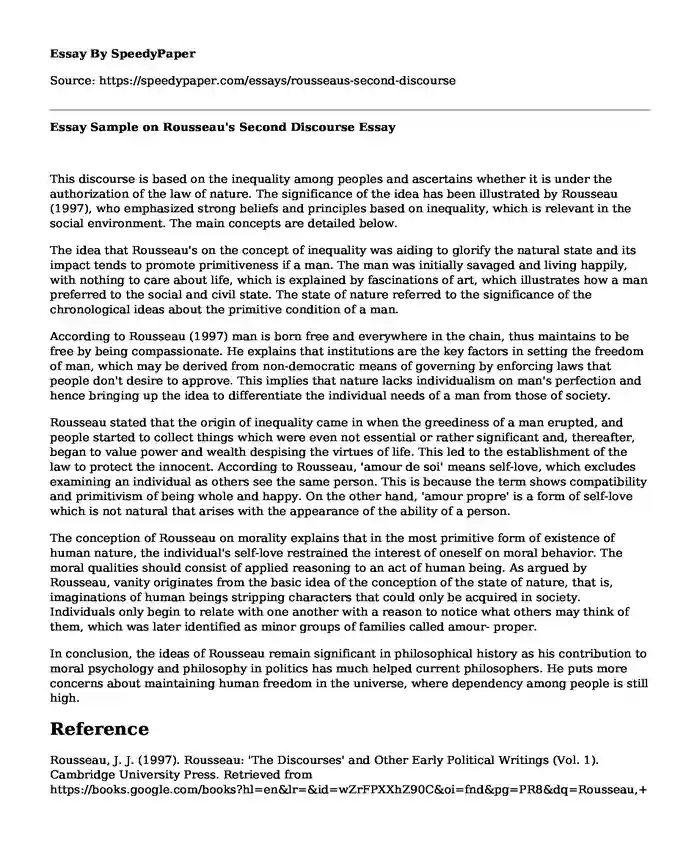
| Type of paper: | Essay |
| Categories: | Society Philosophers Human behavior |
| Pages: | 2 |
| Wordcount: | 534 words |
This discourse is based on the inequality among peoples and ascertains whether it is under the authorization of the law of nature. The significance of the idea has been illustrated by Rousseau (1997), who emphasized strong beliefs and principles based on inequality, which is relevant in the social environment. The main concepts are detailed below.
The idea that Rousseau's on the concept of inequality was aiding to glorify the natural state and its impact tends to promote primitiveness if a man. The man was initially savaged and living happily, with nothing to care about life, which is explained by fascinations of art, which illustrates how a man preferred to the social and civil state. The state of nature referred to the significance of the chronological ideas about the primitive condition of a man.
According to Rousseau (1997) man is born free and everywhere in the chain, thus maintains to be free by being compassionate. He explains that institutions are the key factors in setting the freedom of man, which may be derived from non-democratic means of governing by enforcing laws that people don't desire to approve. This implies that nature lacks individualism on man's perfection and hence bringing up the idea to differentiate the individual needs of a man from those of society.
Rousseau stated that the origin of inequality came in when the greediness of a man erupted, and people started to collect things which were even not essential or rather significant and, thereafter, began to value power and wealth despising the virtues of life. This led to the establishment of the law to protect the innocent. According to Rousseau, 'amour de soi' means self-love, which excludes examining an individual as others see the same person. This is because the term shows compatibility and primitivism of being whole and happy. On the other hand, 'amour propre' is a form of self-love which is not natural that arises with the appearance of the ability of a person.
The conception of Rousseau on morality explains that in the most primitive form of existence of human nature, the individual's self-love restrained the interest of oneself on moral behavior. The moral qualities should consist of applied reasoning to an act of human being. As argued by Rousseau, vanity originates from the basic idea of the conception of the state of nature, that is, imaginations of human beings stripping characters that could only be acquired in society. Individuals only begin to relate with one another with a reason to notice what others may think of them, which was later identified as minor groups of families called amour- proper.
In conclusion, the ideas of Rousseau remain significant in philosophical history as his contribution to moral psychology and philosophy in politics has much helped current philosophers. He puts more concerns about maintaining human freedom in the universe, where dependency among people is still high.
Reference
Rousseau, J. J. (1997). Rousseau: 'The Discourses' and Other Early Political Writings (Vol. 1). Cambridge University Press. Retrieved from https://books.google.com/books?hl=en&lr=&id=wZrFPXXhZ90C&oi=fnd&pg=PR8&dq=Rousseau,+J.+J.+(1997).+The+discourses+and+other+political+writings.&ots=xBwgqQcQxo&sig=t2cPe6vC5RPFRdexUrPCWnAO6EQ
Cite this page
Essay Sample on Rousseau's Second Discourse. (2023, Mar 12). Retrieved from https://speedypaper.com/essays/rousseaus-second-discourse
Request Removal
If you are the original author of this essay and no longer wish to have it published on the SpeedyPaper website, please click below to request its removal:
- Free Essay for You: Disorganization and Social Learning Theories
- Essay Example: Travel and Tourism Industry Analysis
- Geologic Hazards, Geology Essay Example
- Transformed by the 'Magic Secret' - Creative Writing Essay Example
- Free Essay Sample Dedicated to the National Education Association
- Essay Sample on Delightful Living in Macomb County
- Essay Sample on Foreign Policy Analysis, Egypt's Grand Strategy
Popular categories




